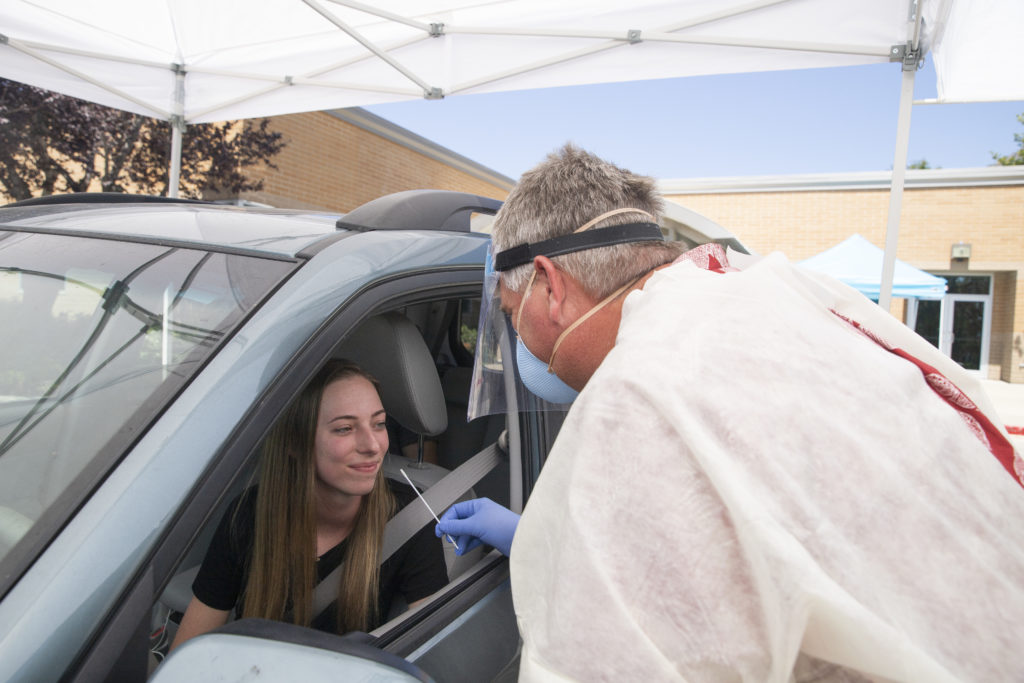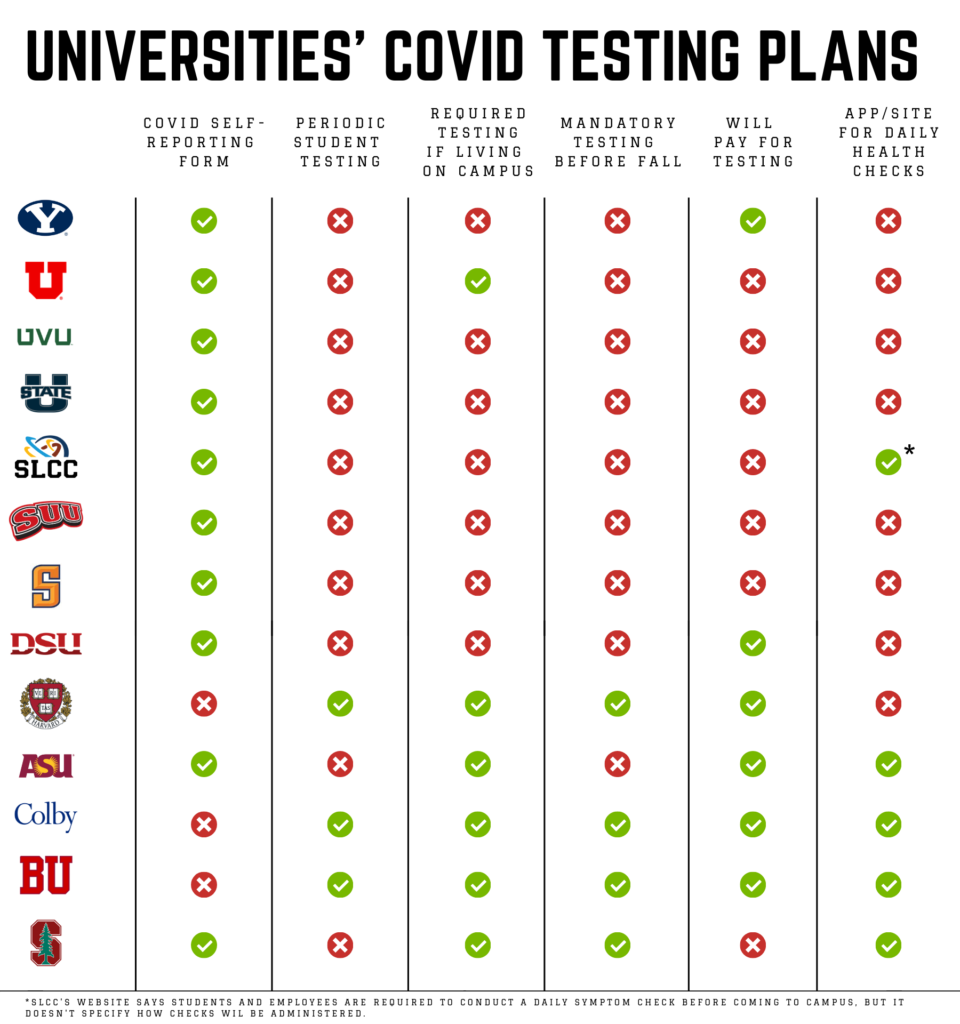Leer en español: ¿Cómo será la estrategia de pruebas para el COVID-19 en BYU para el semestre de otoño?
The Daily Universe is answering student, staff and parents’ questions about how the coronavirus will impact the BYU community during Fall Semester 2020 in a series of stories. Submit questions at
BYU will take a more laissez-faire approach to COVID-19 testing this Fall Semester than some other colleges and universities.
BYU spokeswoman Carri Jenkins said the university will not require students, faculty or staff to be tested in order to return to campus nor will temperature checks be required to enter the campus.
Instead, “students, faculty and staff should perform daily symptom checks, get tested for COVID-19 if symptomatic, self-report test results and follow isolation or quarantine instructions,” Jenkins said.

BYU’s testing plan, according to Jenkins, requires the testing of students and employees within four broad categories: symptomatic individuals, those who have had close contact with a known COVID case, risk-based evaluation and testing, and randomized testing across the BYU community.
She did not specify to what degree randomized testing will be implemented but said testing instructions would be given to those who are tested, nor did she comment on how this strategy will protect the community from asymptomatic individuals spreading the virus.
When asked whether BYU has a plan to release information on where outbreaks are taking place, like in off-campus housing complexes, Jenkins said, “The Utah County Health Department is responsible for monitoring all outbreaks in Utah County, including BYU.”
She also said whether students wards will have any role in testing those who attend worship services would be addressed by ecclesiastical leaders.
Other university testing plans
The approach higher education institutions are taking with COVID-19 testing varies immensely across the board, although most are partnering with local health officials for contact tracing.
Some are implementing rigorous testing — such as Colby College, which will require all 2,000 students to be tested every other day for two weeks and then twice a week after that as well as Boston University, which plans to test most students at least once a week.
Harvard University is asking all students to be tested before they arrive on campus and will then test them one to three times a week depending on whether they live on-campus and how often they need to be on campus for work or classes.
Other universities have decided on less intensive testing, such as Stanford, which will only require those who are returning from outside of Northern California to be tested prior to coming to campus.
Closer to home, universities’ testing plans vary less. Not a single large university in Utah plans on requiring its students and employees to be tested before the start of the semester or to conduct periodic testing.
The University of Utah, however, will require all students living on campus to be tested before they can move in. Students living off-campus, staff and faculty are asked to take a test if they exhibit symptoms but are not required to do so — a policy most other Utah universities have adopted along with a self-reporting form for those who have tested positive for COVID.
BYU and Dixie State will cover the cost of testing for their students and employees in Utah. Anyone with health insurance who has a medical reason to be tested — such as they have COVID symptoms, have been in close contact with someone who has the virus, or have a referral from a health professional — is entitled to a 0% copay under the Families First Coronavirus Response Act.

A recent study conducted by researchers at Harvard and Yale suggests the less intensive testing plans adopted by Utah universities may not be effective.
Researchers used a model involving a residential campus with 5,000 students — 4,990 uninfected and 10 who were asymptomatic — during an 80-day semester stretching from Labor Day to Thanksgiving.
Researchers found “symptom-based screening alone was not sufficient to contain an outbreak” and that there was “no circumstance in this modeling study under which symptom-based screening alone would be sufficient to contain an outbreak.”
Testing all students every two days with “a rapid, inexpensive, and even poorly-sensitive” test paired with uncompromising vigilance and continuous attention to good prevention practices may be the only way to safely reopen campuses in the fall, according to the researchers.
“This is an exceptionally high bar, and it may well be beyond the capacity of many schools,” the lead author, A. David Paltiel, told Inside Higher Ed in an interview.
The authors estimated the per-student cost over an 80-day semester of implementing their recommendation every one, two or seven days were $910, $470 or $120 respectively.
Implementing the researcher’s plan to test BYU’s 33,511 students every two days would come out to $15.7 million.
Since BYU is a private university, it does not release information about its finances. However, it was ranked 51st out of the top 120 U.S. degree-granting postsecondary institutions with the largest endowments in 2018, the most recent year in which data was collected.
Colby College, which will test students twice a week, didn’t make the list. Boston University and Harvard, which will implement weekly testings of students, came in at 44 and 1, respectively. While BYU’s $1.9 billion endowment isn’t a match for Harvard’s, it does come close to Boston’s $2.1 billion endowment. The two schools’ student body sizes are also similar, with BU having 35,472 students.
But costs aren’t the only factor preventing universities from implementing more rigorous testing plans; processing capabilities of labs, availability of testing kits and concerns about invasiveness all influence how universities make decisions about COVID-19 testing for the fall.
An invited commentary on the study called its findings “an important wake-up call” and noted they far exceed the guidelines from the Centers for Disease Control and Prevention.
However, the commentary also noted that even testing every four or two weeks could be enough to contain outbreaks if other behavioral guidelines are followed.
“Thus, before diverting resources from other interventions to testing every two days, we should consider a broader perspective,” the commentators wrote. “The best-prepared campuses will implement a set of interlocking strategies that together aim, first, to reduce the influx of COVID-19 from outside and, second, to limit its spread once on campus.”
Some of the commentators’ strategies — like social distancing, contact tracing and amplified cleaning — are already being implemented at BYU, but others — such as requiring all students to produce evidence of a negative COVID-19 test prior to move-in, sending students a travel personal protective equipment kit and instructions about how to travel safely, and administering confirmation tests in the early days of the semester — don’t fall within BYU’s plan.
The commentators emphasized that “one size does not fit all” when it comes to universities and COVID-19 testing, but the BYU community won’t know until it’s too late if the size and scope of BYU’s plan will be enough to prevent an outbreak.





